TASA Habitat Forum | Symposium on Building an Intelligent Future: Reshaping Life Scenarios Through Integration of Art and Technology Successfully Concluded in Qingdao
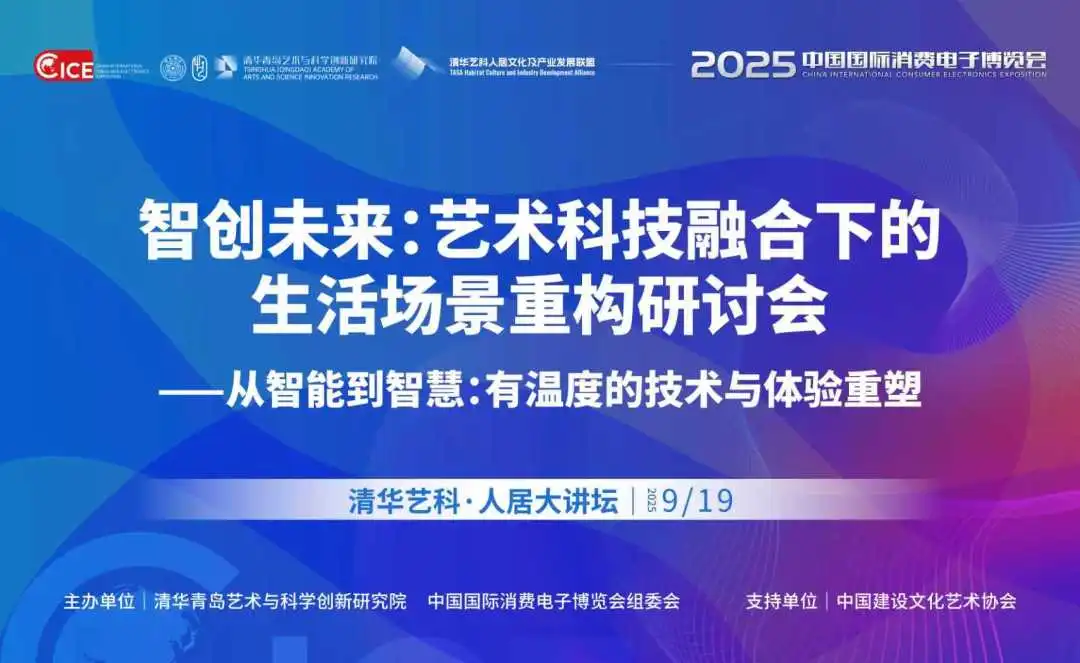 The TASA Habitat Forum — Symposium on Building an Intelligent Future: Reshaping Life Scenarios Through Integration of Art and Technology, jointly organized by Tsinghua (Qingdao) Academy of Arts and Science Innovation Research (TASA) and the Organizing Committee of China International Consumer Electronics Exposition (CICE), was successfully held at the Qingdao International Convention and Exhibition Center on the afternoon of September 19, 2025. The Symposium brought together scholars from prestigious universities such as Tsinghua University, as well as experts from leading industry enterprises including BOE, JD Technology (JDT), and Voicecomm Technology, to discuss the people-centric transformation from intelligence to wisdom, delve into the innovative application of artificial intelligence (AI) in the integration of art and technology, and explore pathways to reshaping the human settlement experience with human-care technology and bringing into full play the role of AI in the improvement of life quality and industrial effectiveness.
The TASA Habitat Forum — Symposium on Building an Intelligent Future: Reshaping Life Scenarios Through Integration of Art and Technology, jointly organized by Tsinghua (Qingdao) Academy of Arts and Science Innovation Research (TASA) and the Organizing Committee of China International Consumer Electronics Exposition (CICE), was successfully held at the Qingdao International Convention and Exhibition Center on the afternoon of September 19, 2025. The Symposium brought together scholars from prestigious universities such as Tsinghua University, as well as experts from leading industry enterprises including BOE, JD Technology (JDT), and Voicecomm Technology, to discuss the people-centric transformation from intelligence to wisdom, delve into the innovative application of artificial intelligence (AI) in the integration of art and technology, and explore pathways to reshaping the human settlement experience with human-care technology and bringing into full play the role of AI in the improvement of life quality and industrial effectiveness.
This Symposium is a significant initiative by TASA to promote local industry-university-research collaboration and respond to the transformative impact of the integration of art and technology on life. It has received strong support from enterprises and institutions, including Tsinghua University, China Construction Culture and Art Association (CCCAA), the Organizing Committee of China International Consumer Electronics Exposition, and the Commerce Bureau of Qingdao West Coast New Area.
Guest Speech
Mr. LI Zequan, Member of the Party Group and Deputy Director of the Commerce Bureau of Qingdao West Coast New Area, and Mr. WANG Jiansong, Tenured Professor at the Academy of Arts & Design, Tsinghua University (AADTHU), Executive Vice President of TASA, and Executive President of the Environmental Art Committee of CCCAA, delivered opening remarks at the Symposium successively.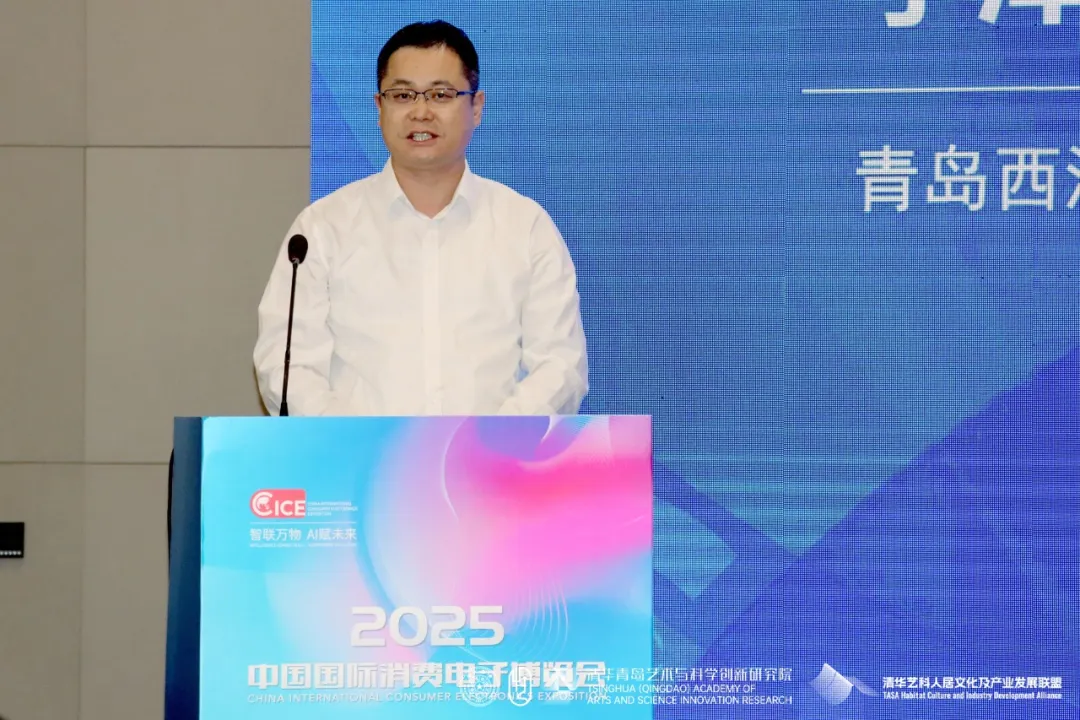
Opening remarks by Mr. LI Zequan
Mr. LI Zequan sincerely thanked individuals from all sectors for their support of Qingdao’s development. He pointed out that this Symposium was convened at a critical juncture of AI and consumer electronics transformation, aiming to promote the humanization of technology and the human-care aspect of AI. He fully affirmed the important role of TASA in the integration and innovation of industry-university-research, expressed expectations for its injection of new momentum into Qingdao’s development, and stated that the government of Qingdao West Coast New Area would continue to optimize the business environment and service guarantees to create a better future with all parties.
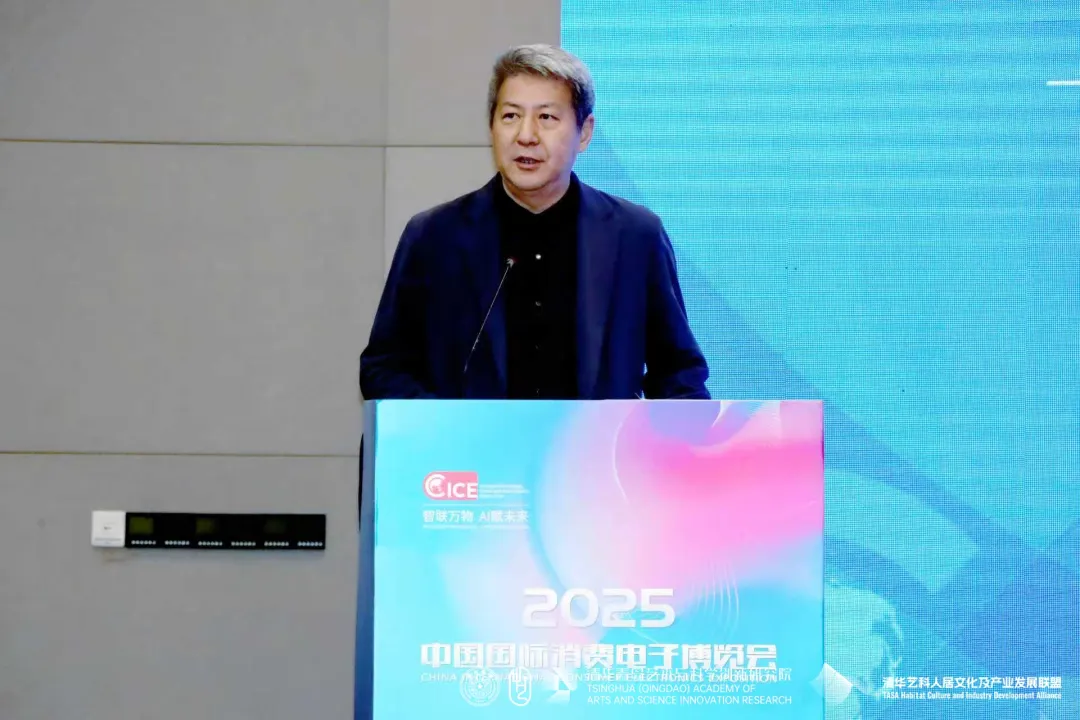 Opening remarks by Mr. WANG Jiansong
Opening remarks by Mr. WANG Jiansong
In his speech, Mr. WANG Jiansong warmly welcomed the guests and audience, and thanked CCCAA, the Organizing Committee of China International Consumer Electronics Exposition, and the Commerce Bureau of Qingdao West Coast New Area for their strong support of this Symposium. He pointed out that this Symposium was an important move for TASA to deeply participate in the national consumer electronics industry upgrading and promote the integrated innovation of art and science. As a platform for the integration of arts and sciences jointly established by Tsinghua University and Qingdao, TASA is actively gathering academic resources and industrial forces from all sides, and integrating artistic sensibility and scientific rationality, so as to build a new humanistic ecosystem that is caring, perceptible, and future-oriented.
Main Topic Sharing
The keynote speeches, themed From Intelligence to Wisdom: Reshaping Experience with Human-care Technology, focused on cutting-edge innovative practices in digital culture and tourism, smart elderly care, visual impairment assistance, national gift design, and smart homes. Keynote speakers included XIAO Chengyi, Deputy Director of the Interactive Media Institute at AADTHU, Academic Advisor for the CMG Meta Museum, and Deputy Director of the Upgrading and Reinventing Innovative Design Studio at TASA; ZHENG Yue, Vice President of BOE Ewin Technology Co., Ltd. and General Manager of Shandong Ewin Culture Technology Co., Ltd.; TANG Jinghua, founder and Chairman of Voicecomm Technology, and Vice President of the National AI Achievement Transformation Research Institute at Shanghai Jiao Tong University; LIU Zhigang, Associate Professor at Shandong University of Art & Design and Lead Creator of the National Gifts for the SCO Qingdao Summit; SUN Yawen, Deputy Sales Director of the Artificial Intelligence Business Department of JDT; XU Gang, Design Director of the Environmental Construction Art Consulting Institute at AADTHU and Director of the Human Settlements Environment and Lifestyle Design Lab at TASA; and YUE Han, Lecturer and Master’s Supervisor at the University of Science and Technology Liaoning and a holder of a Ph.D. in Industrial Design from Tsinghua University. These experts and industry leaders collectively explored how intelligent products can evolve from the functional role to the emotional role and progress from mere tools to human companions, aiming to outline a new vision for a more inclusive, sustainable, and humanistic smart life.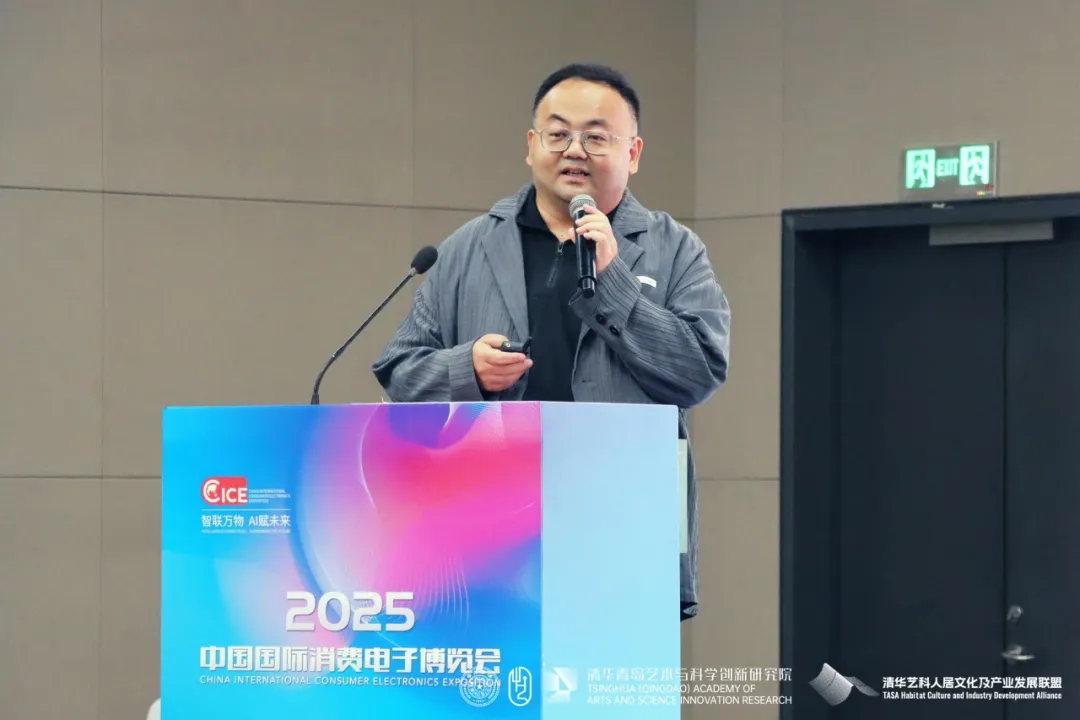
Keynote speech by Mr. XIAO Chengyi
Mr. XIAO Chengyi, with the topic of Elegant Cyberspace · Integration of Digital and Physical Realms, shared his team’s in-depth exploration in the digitalization of cultural museums and tourism. He proposed that, based on AI and large-space VR/UMR technology, immersive activation and cross-scenario reuse of cultural IPs can be achieved efficiently at low cost to help rejuvenate traditional spaces and promote cultural outreach. Ultimately, through digital copyright mechanisms, a sustainable value return ecosystem for creative designers can be built.
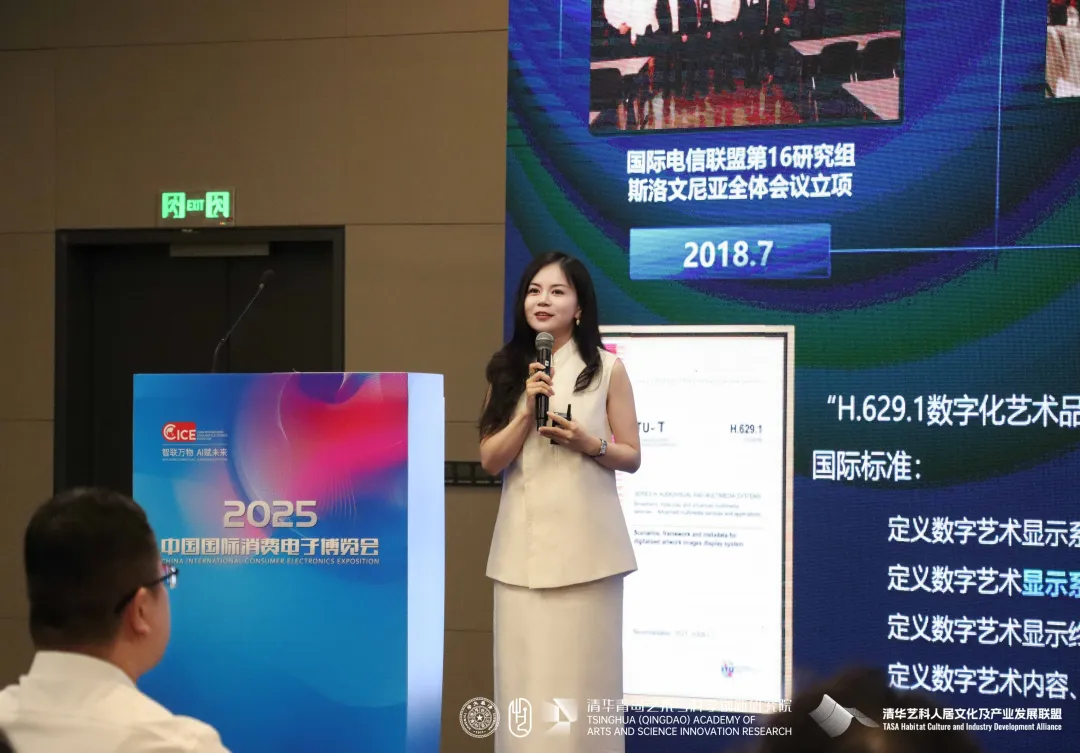 Keynote speech by Ms. ZHENG Yue
Keynote speech by Ms. ZHENG Yue
In her presentation, Ms. ZHENG Yue emphasized that BOE Ewin Technology, based on its leading display technology, empowers innovation in digital art experiences through cross-boundary efforts. Through its self-developed international standard for digital art display and full-scenario solutions, the company has successfully created the world’s first digital art museum and launched mobile exhibition products such as the Digital Box and Digital Caravan, bringing cultural heritage to life and out into the world. It is committed to reshaping the way culture is disseminated and perceived through the power of technology, integrating beauty into life, and turning screens into a new medium for conveying care and emotion.
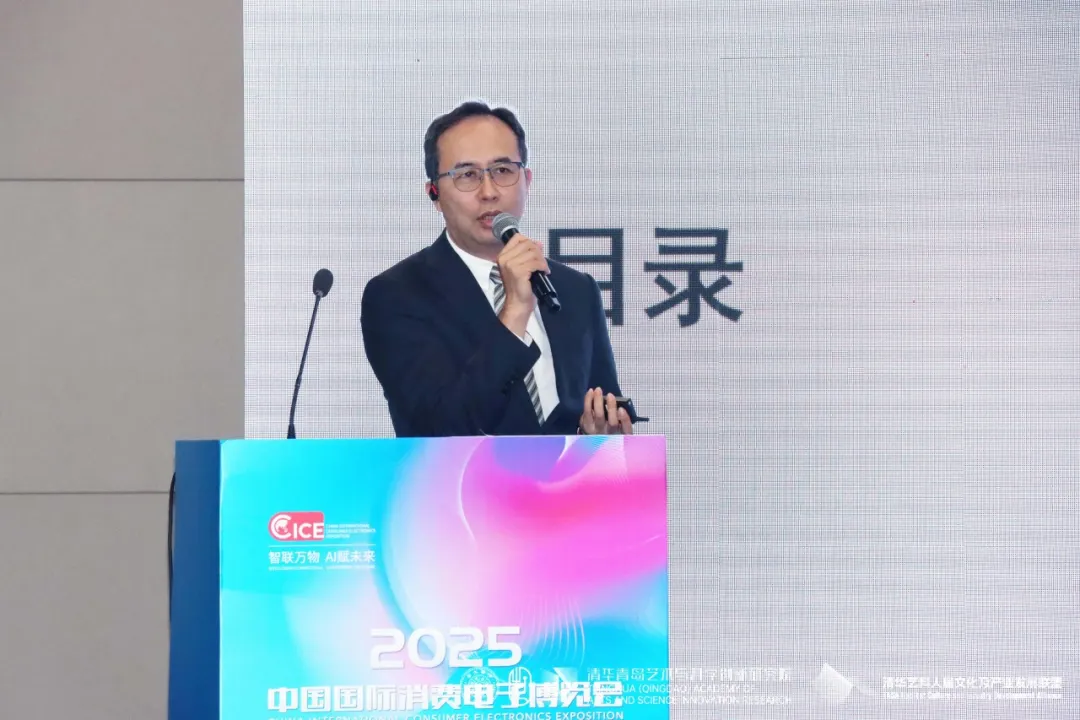 Keynote speech by Mr. TANG Jinghua
Keynote speech by Mr. TANG Jinghua
Mr. TANG Jinghua systematically introduced a home-based elderly care solution built on Trustworthy Artificial Intelligence Technology. This solution integrates multimodal perception, cloud-edge-device collaboration, and privacy protection technologies. By constructing a smart health and wellness platform capable of emotional interaction, it uses reliable and caring AI technology to safeguard the elderly, respond to their real needs, and strive to make AI a meticulous, thoughtful, trustworthy, and caring companion integrated into their daily lives.
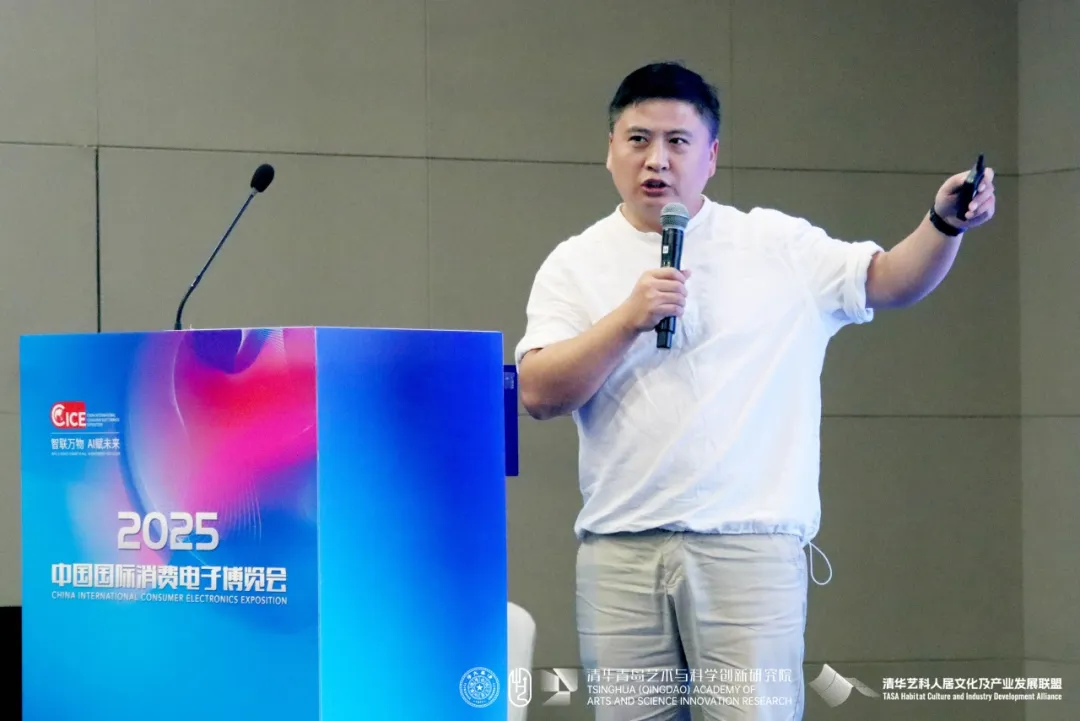 Keynote speech by Mr. LIU Zhigang
Keynote speech by Mr. LIU Zhigang
Mr. LIU Zhigang used the Design of National Gifts for the SCO Summit as an example to explain how profound cultural symbols and emotional value can be integrated into design. Using artifacts such as the guqin (an ancient Chinese string instrument), intertwined trees, and glass chimes as carriers, and through the innovative fusion of traditional craftsmanship and modern design language, he conveyed the national demeanor of ritual order, harmony, and friendship, demonstrating the cultural confidence and creative human-care connotation characterized by “world-class standards, Chinese style, Shandong character, and Qingdao features.”
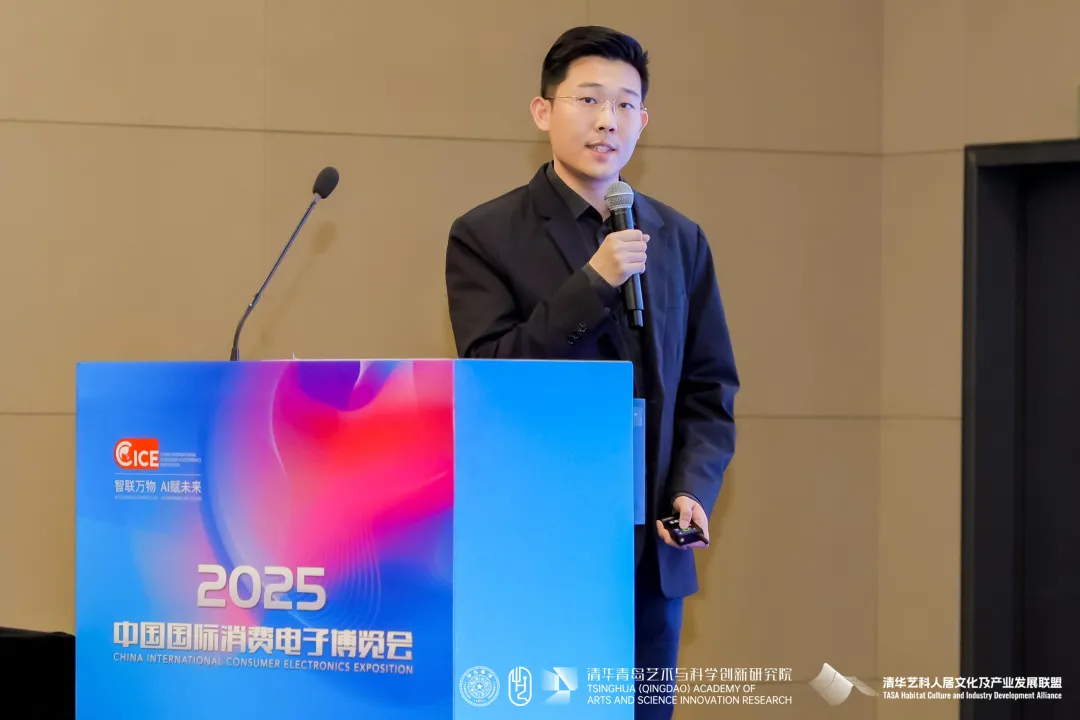 Keynote speech by Mr. SUN Yawen
Keynote speech by Mr. SUN Yawen
Mr. SUN Yawen systematically explained the intelligent interaction capabilities accumulated for more than 10 years in diverse scenarios such as customer service, digital human, and shopping guide, based on JD’s large model. The JoyInside platform boasts four major advantages: high emotional quotient dialogue experience, adaptation to diverse scenarios, a vast selection of characters, and high consistency in speech and action. Partnering with hardware manufacturers, it strives to create intelligent companions with highly specialized AI brains and ultra-realistic conversational abilities, comprehensively enhancing human-computer interaction and providing human-care ubiquitous terminals. He emphasized that, from robots that help you fetch packages to AI chat companions, JoyInside is proving that the ultimate form of intelligence is to promote technology to understand what humans leave unsaid.
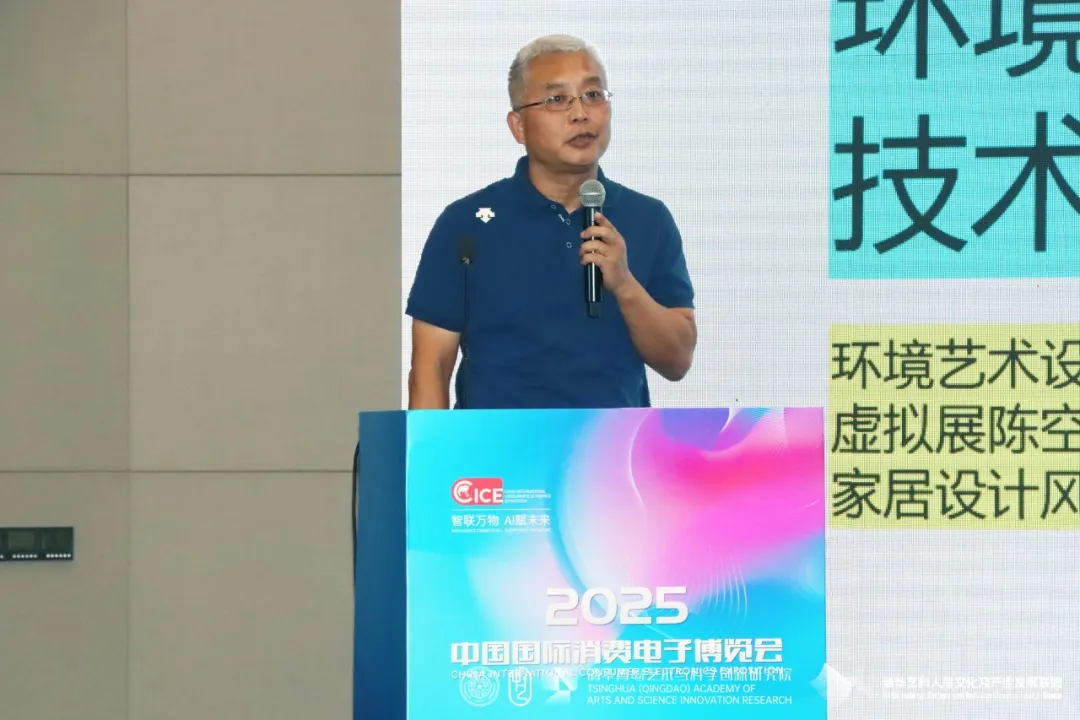 Keynote speech by Mr. XU Gang
Keynote speech by Mr. XU Gang
Mr. XU Gang emphasized that outstanding spatial design should transcend physical form, deeply integrate digital technology and human perception, meet the real needs of users, focus on the requirements and technical implementation of environmental art design scenarios, and build “heartfelt scenes” that combine function and emotion. At the same time, he cautioned against the trap of “pseudo-scenarios,” advocating for design that is sustainable and experiential, and resonates with life.
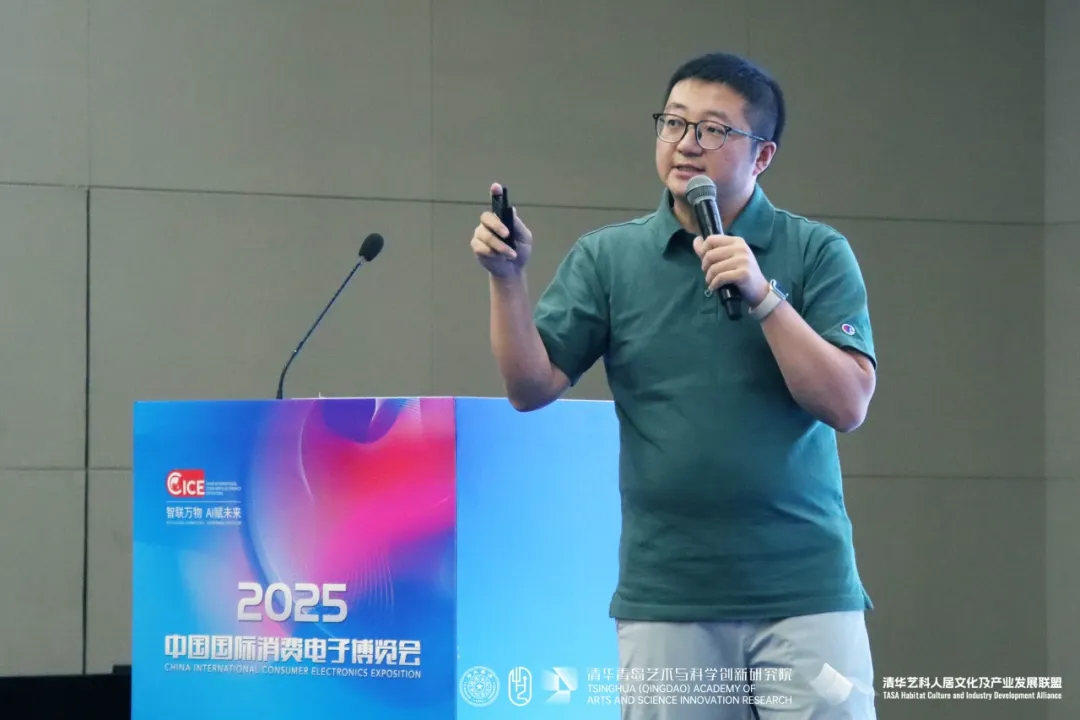 Keynote speech by Mr. YUE Han
Keynote speech by Mr. YUE Han
Mr. YUE Han systematically elaborated on the research findings from his paper regarding travel assistance design for the visually impaired. Using empirical research methods, he constructed a user-centric design strategy model, advocating that design should go beyond mere technological combination. Rather, it should use rigorous, caring, and trustworthy technological products to create safe, equal, and dignified travel experiences for the visually impaired.
Panel Discussion
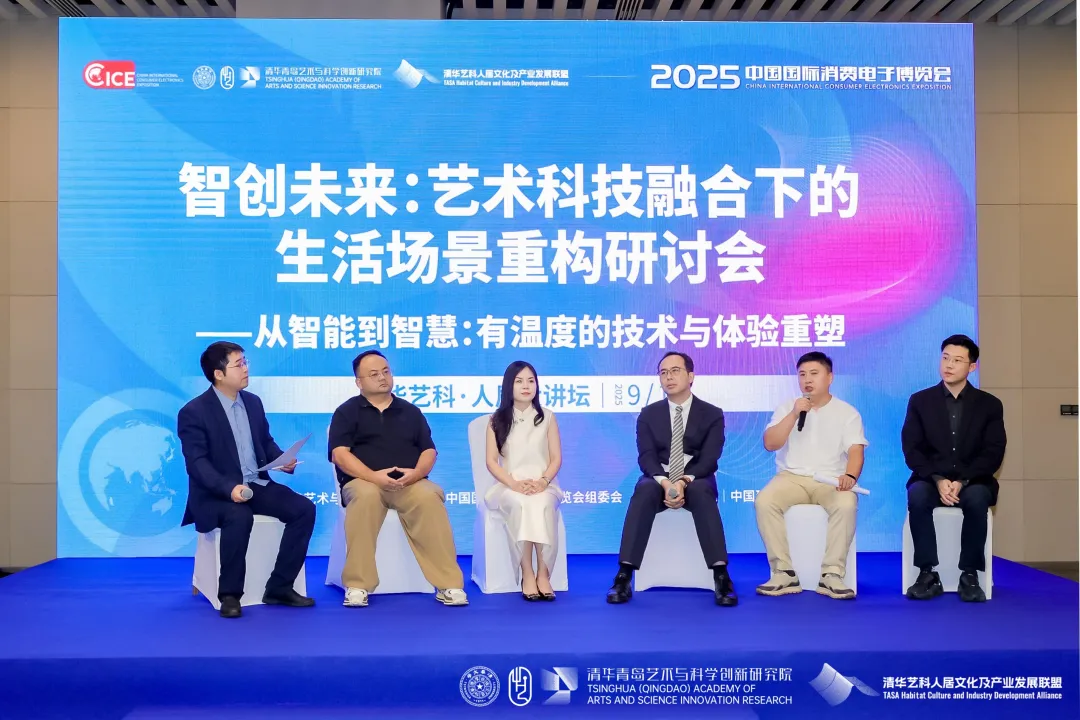 The panel discussion, titled New Vision for Smart Living: The Human Habitat Transformation from Technological Empowerment to Experience Reshaping, was moderated by ZHANG Qing, a design advisory expert at China Industrial Link (Beijing) Research and Consulting Institute of International Equipment Manufacturing, a special research fellow at Hohhot Institute of Modern Synthetic Biology, and Director of the Digital Intelligence Innovation Design Studio at TASA. He engaged in an in-depth dialogue with five experts: Mr. XIAO Chengyi, Ms. ZHENG Yue, Mr. TANG Jinghua, Mr. LIU Zhigang, and Mr. SUN Yawen. The discussion focused on three major themes: Defining Caring Technology, Co-building the Art-Tech Industry Ecosystem, and Future Paths for the Fusion of Three Realms. The panelists frequently delivered insightful quotes, engaged in intense intellectual exchange with broad perspectives, combined technical foresight and humanistic depth in the discussion, and pushed the Symposium to a peak of brainstorming.
The panel discussion, titled New Vision for Smart Living: The Human Habitat Transformation from Technological Empowerment to Experience Reshaping, was moderated by ZHANG Qing, a design advisory expert at China Industrial Link (Beijing) Research and Consulting Institute of International Equipment Manufacturing, a special research fellow at Hohhot Institute of Modern Synthetic Biology, and Director of the Digital Intelligence Innovation Design Studio at TASA. He engaged in an in-depth dialogue with five experts: Mr. XIAO Chengyi, Ms. ZHENG Yue, Mr. TANG Jinghua, Mr. LIU Zhigang, and Mr. SUN Yawen. The discussion focused on three major themes: Defining Caring Technology, Co-building the Art-Tech Industry Ecosystem, and Future Paths for the Fusion of Three Realms. The panelists frequently delivered insightful quotes, engaged in intense intellectual exchange with broad perspectives, combined technical foresight and humanistic depth in the discussion, and pushed the Symposium to a peak of brainstorming.
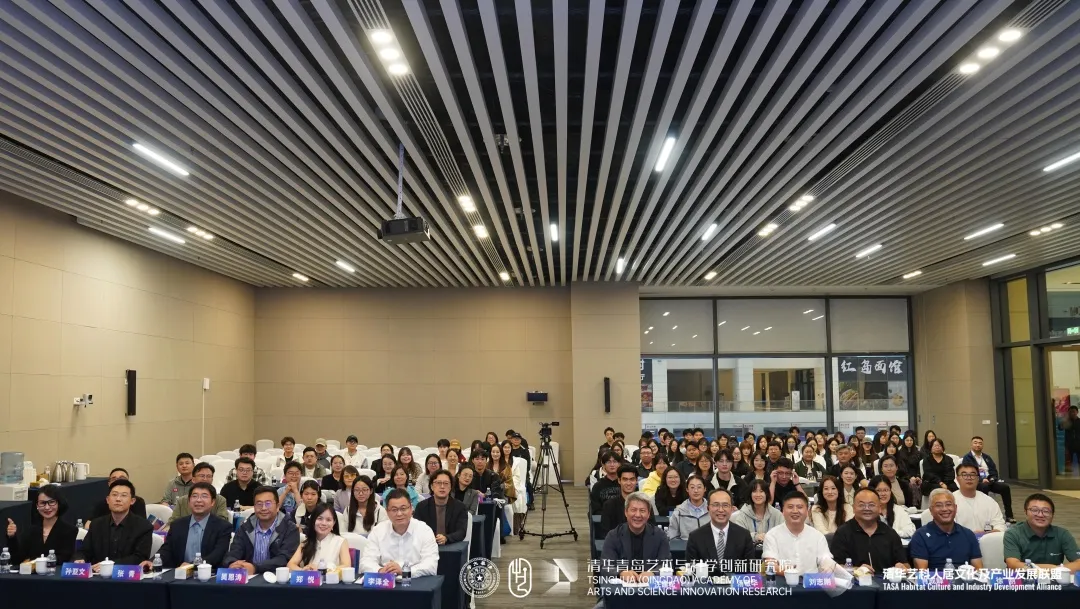 Group Photo
Group Photo
The successful conclusion of this Symposium provided important ideas and solid support for promoting industrial upgrading through the deep integration of art and technology. In the future, TASA will continuously rely on the academic brand of TASA Habitat Forum, persistently gather academic wisdom and industrial strength, and actively promote the deep integration and innovative application of artificial intelligence and innovative design in multi-dimensional scenarios such as smart living, health and wellness care, digital culture and tourism, and smart homes. TASA is committed to building an open, collaborative, and sustainable ecosystem for the integration of arts and sciences. By promoting the transformation of scientific and technological achievements and cross-boundary cooperation, it will continuously empower the local economy and high-quality industry development with human-care innovation, injecting richer humanistic care and technological momentum into the future of the human habitat.
